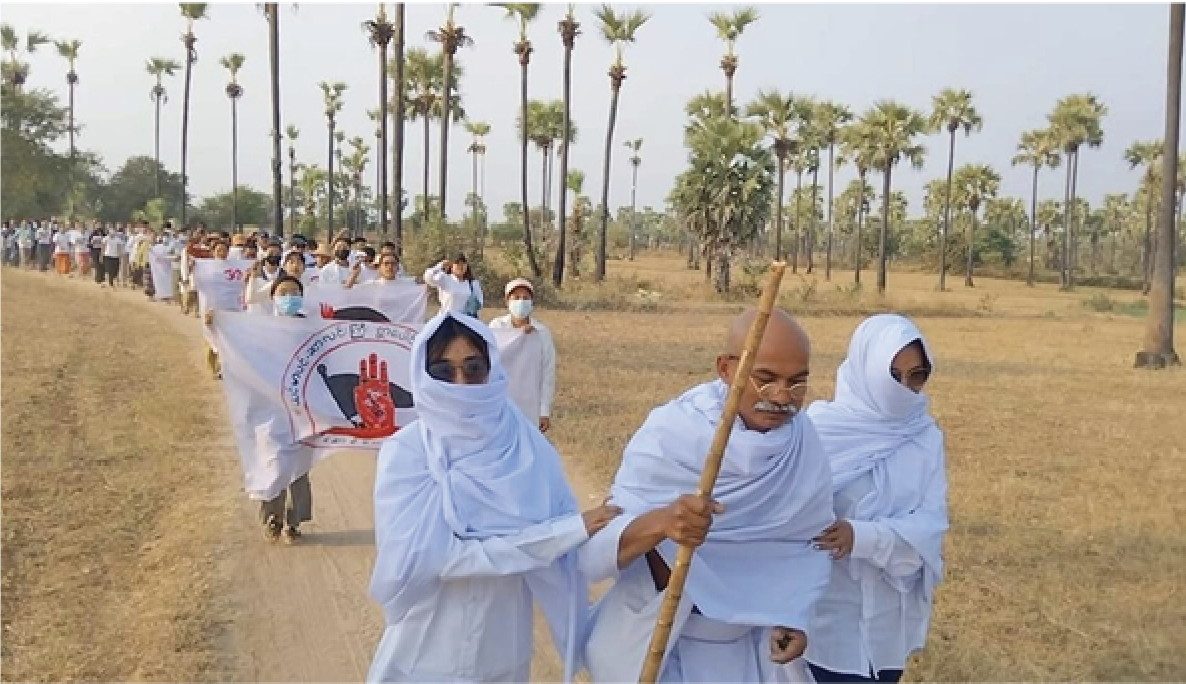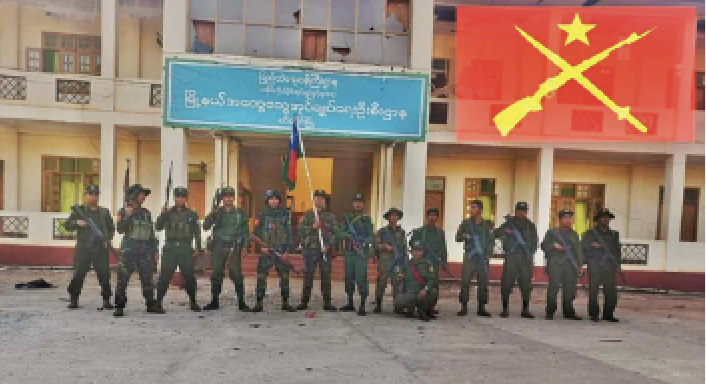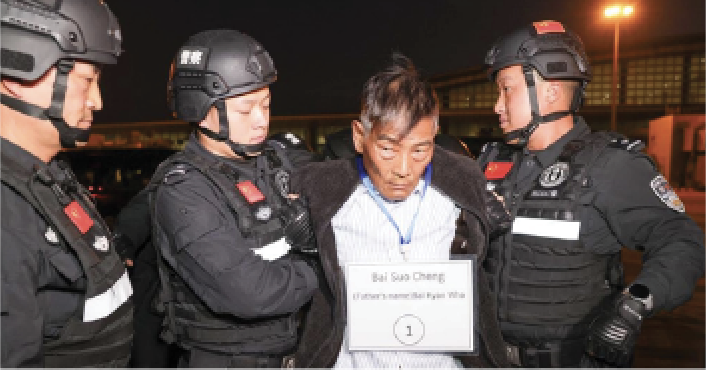
Introduction
Nationwide public movements which marked the third anniversary of the military coup on 1 February 2024 took place in two ways – “Silent strike” and “White campaign”.
The country has seen various forms of peaceful public movements against the coup, over the past three years. The Spring Revolution (or) the People’s Revolution, which began with the anti-coup protests with the slogan “Return the power to the people,” has long been putting pressure on the junta, ranging from the non-violent public strikes to military, political and international affairs and marching with the aim of ending all dictatorships, including the military dictatorship and building a federal democratic union.
This week, Burma News International (BNI) – Myanmar Peace Monitor’s bi-weekly news review will approach the peaceful public movements found during the three-year period of the military coup and the stances which lead to the military and political shifts, significant events and the signs of declining military council.
Silent Strike and White Campaign

From 10 am to 4 pm on 1 February 2024, the silent strikes took place in cities such as Yangon, Mandalay, Mogok, Monywa, Salingyi, Yinmarbin, Kani, Shwebo, Myaing, Mudon, Kawa, Ywangan and Hpakant. 1
As a non-violent public movement against the junta, the people also organized the White Campaign by wearing white shirts, ribbons, headbands and wristbands.
A Yinmarbin-Salingyi multi-village strike column in Sagaing Region, held an anti-dictatorship strike in cooperation with local strike forces. It was also joined by Women Alliance Burma (WAB), Magway Public Strike Committee, Kani Township Strike Leading Committee and Monywa People’s Strike Leading Committee. 2

General Strike Coordination Body (GSCB) said it has three objectives pertaining to the White Movement on the third anniversary of the coup. The first objective is to urge the international community and countries to stop selling transport and aviation fuel to Myanmar’s military. The second objective is to urge Myanmar expats to refrain from paying blood taxes forcibly imposed by the military regime. The third objective is to urge every soldier at every level in the chain of command to defect and stop sacrificing their own lives to protect the wealth of a handful of generals as soon as possible. The GSCB announced that the White Movement would be carried out every Monday.
Joint Position Statement
On 31 January 2024, a joint position statement was issued by Chin National Front (CNF), Karenni National Progressive Party (KNPP), Karen National Union (KNU) and National Unity Government (NUG), which are allied organizations engaged in revolutionary struggle towards annihilation of military dictatorship and establishment of a federal democratic union. The joint position statement covers one vision, six objectives, nine positions and six action plans. It is evident that the fact that “Negotiations with the responsible leadership of the Myanmar military to terminate military rule and for peaceful transition of power, subject to their unconditional acceptance of the six political objectives” opens a door for talk. Six political objectives are: (a) to overturn the usurpation of state power by the military, and to terminate the involvement of the armed forces in politics, (b) to ensure that all armed forces operate solely under the command of a civilian government elected through democratic processes, (c) to abrogate the constitution of 2008 in its entirety, and to quash all attempts to reinstate its provisions, (d) to draft and promulgate a new constitution that embodies federalism and democratic values, garnering the consensus of all relevant parties, (e) to establish a new federal democratic union in accordance with the proposed federal democratic constitution and (f) to institute a system of transitional justice in order to address and remedy the injustices inflicted upon innocent parties throughout the conflict. 3
So, the officials within the military group which has been under military, political and international pressures must decide themselves whether or not they can accept six political objectives.
Significant events
After “Operation 1027 ” that began in the northern Shan State, coordinated offensives by the revolutionary forces engaging in intensifying resistance war against the junta have gained momentum and intensified.
Revolutionary forces have controlled and captured up to 39 towns in northern Shan State, Kachin State, Sagaing Region, Chin State, Karenni (Kayah) State, Karen State and Arakan State. 4 In addition, they seized more than 400 small and big military camps and a large quantity of military equipment including armoured tanks. 5

Although the “Haigeng Agreements” 6 obtained through the mediation of the Chinese government may halt the momentum of the military campaign for the junta in northern Shan State, the junta is facing strong offensives in Arakan State and Karen State, Karenni (Kayah) State and southern Shan State in southern Myanmar.
The junta lost Pauktaw in Arakan State and Paletwa in Chin State to the Arakan Army (AA) while the Pa-O National Liberation Organization/ Pa-O National Liberation Army (PNLO/PNLA) captured Hsihseng town in southern Shan State. The joint Karenni forces have taken control of Mawchi and Ywar Thit town in Karenni (Kayah) State.
A Euro copter 365 military transport helicopter was shot down in Myawaddy Township of Karen State, killing five junta soldiers including Brigadier General Aye Min Naung. The revolutionary forces shot up to three airplanes down in this year’s January alone. 7
In the recent statement by the PNLO/PNLA, which held talks with the military junta during the coup by adhering to the Nationwide Ceasefire Agreement (NCA), the PNLO/PNLA said it would join hands with its alliances in the fight against Myanmar’s military until the end of the military dictatorship and the establishment of the federal democratic system the entire public is longing for. The statement is significant.
Collapse signs of military council
On 30 January 2024, the junta handed over 10 criminal suspects including Bai Suo Cheng who was ex-chair of Kokang Self-Administered Zone and ex-MP of Union Solidarity and Development Party (USDP), to the Chinese government. Arrests warrants were issued for him for allegedly running Kyar Phyant or online fraud.

The Myanmar police handed over six key leaders involved in Kokang telecom fraud gangs, namely Bai Suo Cheng, Bai Ying Cang, Wei Huai Ren, Liu Zheng Xiang, Liu Zheng Mao and Xu Lao Fa and four other major criminal suspects in Kokang in northern Myanmar, over to China in accord with the law. They all were transported to China the same night, according to the Chinese Embassy in Myanmar. 8
The military council sent Daw Malar Than Htike, permanent secretary of the Ministry of Foreign Affairs, to attend the ASEAN Foreign Ministers’ Meeting in Luang Prabang, Laos. The junta did not attend the ASEAN meetings by rejecting the ASEAN’s invitation to send a “non-political” representative to meetings. Now, it can be said that the junta no longer bear the isolations of the international community.
The military council has been facing military pressure from the revolutionary forces in the country and has not received any public support during the three-year military coup. As it is simultaneously experiencing not only isolations by international governments but also influence by neighbouring countries, the junta’s declining signs have gradually become more prominent.
“There is a need to increase the integrated strength by respecting those who sacrificed their lives during the Spring Revolution.”
On 31 January 2024, the National Defense and Security Council (NDSC) meeting declared the extension of a state of emergency for another six months for 5th time. It is found that the NDSC gave an account that the country is not in a normal condition. Plans are under way to take census and hold election.
Review
Three years after the coup, anti-coup movements are still active in different forms and means. The people are calling for an end to the military dictatorship and building the federal democratic union with the slogans of “return the people’s power to the people” and “make all-out efforts for the final victory with the public’s strength.”
As non-violent peaceful protest continues to be enshrined among the people, the armed resistance war has gained momentum. However, even though revolutionary forces have the common position, the disputes between the revolutionary forces and conflict events are also known through news reports. There is a need to increase the integrated strength by respecting those who sacrificed their lives during the Spring Revolution. It is observed that the revolutionary forces must always be careful to strengthen the common agreements between them.
Taking a look at the situations three years after the Spring Revolution, public strike movements may become stronger, and the momentum of the armed resistance has shown no signs of slowing down. It is observed that territorial losses, abandonments of military camps, dwindling military strength and declining signs of military junta become more evident.
White campaign, Common Positions and Declining Signs of Military Council – Issue 137
……………………………………………………………………………………………………….
1 Silent strikes to mark 3rd anniversary of coup were held in some cities, including Yangon.
2 Sagaing villagers stage anti-regime protest on third anniversary of coup.
3 Declaration of Common Positions.
4 39 towns occupied and controlled by revolutionary forces.
5 Myanmar’s Operation 1027 Against The Junta Two Months On.
6 Operation 1027: The Ceasefire Paradox.
7 Five were killed in helicopter crash in Karen State.
8 Military council handed over the Kokang leaders who had been issued arrest warrants, to China.
